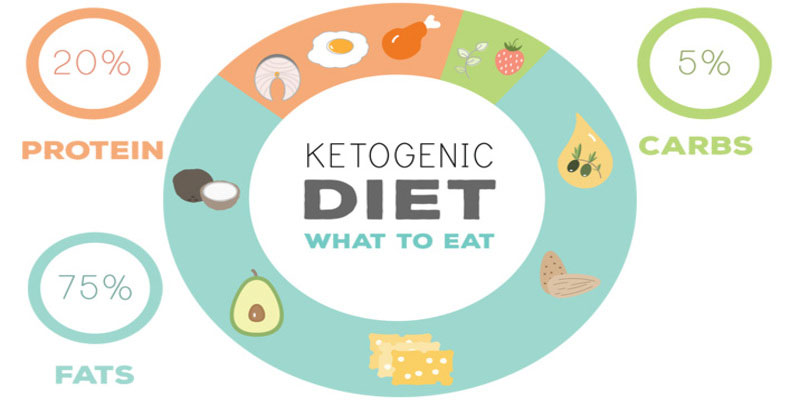
For weight reduction, better glucose management, and even certain medical issues, What is a Ketogenic Diet? the ketogenic diet has gained favor in recent years as a low-carb, high-fat eating plan. The diet is founded on the theory that when you reduce your carbohydrate consumption, your body changes from burning glucose (a form of sugar derived from carbohydrates) for fuel to burning fat, which creates molecules known as ketones. This process is referred to as ketosis, the foundation of the ketogenic diet.
Typically, 70-80% of the diet's calories come from fat, 20-25% from protein, and fewer than 5% from carbs. By substantially limiting carbohydrate consumption and increasing fat consumption, the body enters a state of ketosis in which it utilizes fat as fuel instead of glucose. This has been demonstrated to offer potential advantages for weight reduction, blood sugar management, heart disease risk, and cognitive function. However, hazards and adverse effects are connected with the ketogenic diet, such as "keto flu." Before beginning a ketogenic diet, you should see a healthcare expert to confirm its safety and address possible dangers and adverse effects.
What Is The Ketogenic Diet?
A ketogenic diet is a high-fat, low-carbohydrate, and moderate-protein diet meant to induce ketosis, a metabolic state in which the body burns fat for fuel rather than glucose. Typically, 70-80% of the diet's calories come from fat, 20-25% from protein, and fewer than 5% from carbs.
What Are The Steps In The Ketogenic Diet Process?

When you reduce carbohydrate consumption, your body must find another energy source. It normally converts to glucose, but it converts to fat in the lack of glucose. As fat is broken down, the body generates ketones, which may be utilized as an alternative fuel source. A ketogenic diet aims to induce ketosis by dramatically lowering carbohydrate consumption. In doing so, your body utilizes fat as fuel, and your liver generates ketones, which your brain and muscles may use for energy.
Varieties Of Ketogenic Diet
There are several varieties of ketogenic diets, including:
- Standard Ketogenic Diet (SKD): This is the most popular form of the ketogenic diet, and it consists of ingesting very little carbs (typically fewer than 20-50 grams per day), a moderate quantity of protein, and a large amount of fat.
- Targeted Ketogenic Diet (TKD): This sort of ketogenic diet enables you to eat carbs around your exercises to have the energy to perform at your peak. Athletes and others who participate in vigorous activity often adopt this diet.
- This ketogenic diet cycles between times of rigorous carbohydrate restriction (typically 5-6 days) and periods of heavy carbohydrate intake (usually 1-2 days). Athletes and bodybuilders who want to gain muscle while keeping a low body fat percentage often utilize this diet.
Advantages Of A Ketogenic Diet

- One of the primary reasons individuals adopt a ketogenic diet is to reduce weight. Research has indicated that a ketogenic diet may be an effective method for short-term weight loss. This is because the diet suppresses your appetite and helps you feel fuller for longer, which might contribute to a decrease in caloric consumption.
- Better Blood Sugar Control: Those with diabetes or other illnesses that alter blood sugar levels may benefit from a ketogenic diet. Limiting carbohydrate consumption may improve your blood sugar management and minimize prescription use.
- Decreased Risk of Heart Disease: Many risk factors for heart disease, such as high levels of triglycerides and cholesterol, are improved by a ketogenic diet.
- Many studies have shown that a ketogenic diet may enhance brain function, particularly cognitive function, memory, and concentration.
- A ketogenic diet has also been demonstrated to offer other health advantages, such as decreasing inflammation, enhancing insulin sensitivity, and lowering the chance of developing certain forms of cancer.
Conclusion
A ketogenic diet is a low-carb, high-fat diet meant to induce ketosis, a metabolic state in which the body uses fat for fuel instead of glucose. The diet's potential advantages for weight reduction, better blood sugar management, and other health concerns have increased in popularity. Nevertheless, there are dangers and negative effects linked with the diet, and you should see a healthcare expert before beginning to confirm that it is healthy for you. A ketogenic diet may not be appropriate for everyone, but it may be a beneficial tool for improving health and managing some medical disorders.



